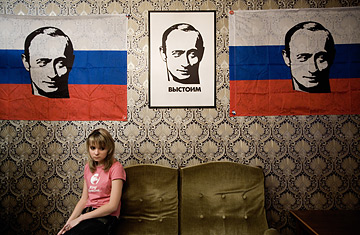
A female member of VV fan club of the Russian president, Vladimir Vladimirovich Putin, sits in a room in Moscow.
(2 of 6)
Radischev's route is 430 miles (700 km). With plenty of detours, I visited hospitals, farmsteads, nightclubs and monasteries. At nearly every stop, I heard something that isn't yet a fully formed National Idea but is perhaps more of a slogan: "Everything is coming back." This meant a lot of things. Some were talking about rising salaries, others about how Russia had re-emerged as a counterweight to America. But more than anything, they were talking about a return to Russia's prerevolutionary sense of itself, strong and traditionbound, rooted in religion and autocracy but with a full bank account and a sleek new weapon in oil.
Yes, Mammon is back in Moscow. There are more billionaires there than in any other city on earth. But in an autocracy, as Radischev once wrote, the leader is like the sun: "Where it shines, there is life. Where it is absent, everything perishes." Beyond Moscow is a country where the average man doesn't live to see 60, where the average income is still just $540 a month. A hundred miles outside Moscow, the main federal highway melts into another century, becoming a four-lane road lined by weathered wooden houses. Old women sit by the shoulder of the road selling apples. There are a few modern rest stops, but just as common are places like Kresttsy, where villagers chop kindling to fire traditional samovar kettles and sell tea and mushroom pierogi, just as they did in Radischev's day, to weary travelers.
One of my first detours on the journey was to a village called Happiness (Radost in Russian), which has kept its upbeat name through grim times in the Soviet era and afterward. But Putin's sun does not shine there yet. "What kind of fool called this place Happiness?" spat Matryona Polikhina, 81, as she sat on the edge of her disheveled barn lot sharpening a knife. Down the road, a 69-year-old neighbor who introduced himself as Uncle Tolya, in the way that peasants in Chekhov stories do, had an equally sharp answer: "What the hell do I know how it got the name Happiness? Better to call it Gloom."
As Moscow booms, Happiness withers. There are no children here, and the school down the road is closing, victim of the so-called perestroika generation — a demographic collapse that followed the fall of the Soviet Union. With a low birth rate and lack of opportunities, villages are few and far between, separated by miles of forest and fallow fields. Putin has named agricultural development one of his four National Priority Projects, calling for increased lending and federal spending to support rural economies. But fertilizer is still expensive. So is machinery. There is not much credit available to farmers. So the majority of people I met seemed content to live off their minuscule pensions, which average $140 a month, rather than risk going into agriculture on their own. If they are grateful to Putin, it's not because of jobs; it's because he has raised their pensions each year by small but significant increments.
While the countryside is economically stagnant, it is undergoing a spiritual renaissance. Eastern Orthodox churches and monasteries have sprung up like mushrooms after rain. And they are catering not just to the older generation. At the Boris and Gleb monastery overlooking the Tvertsa River in the town of Torzhok, all the monks are younger than 40. Two are 19. "In the fight against Western culture, our spirituality is winning," said Alexander Salov, an altarnik at the monastery.
Russia, Born Again
This is the path for a growing number of youth in the new Russia: shunning the modern world to join an anachronistic brotherhood that a British observer once described as "grubby and superstitious." They pray from sunup to sundown, living within a rigid hierarchy of metropolitans, archimandrites and protopopes. They don't shave, and with their long, matted hair and fierce beards, they look more like metalheads than monks. They are often exquisitely reserved — these are not the smiling deacons of U.S. megachurches welcoming you in with coffee and doughnuts. Eastern Orthodoxy seems at times purposefully unfathomable, as if its clerics were more the keepers of dark secrets than spreaders of the Good Word.